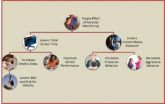(Press-News.org) Bottom Line: Stiffening of the arteries appears to be associated with the progressive buildup of β-amyloid (Αβ) plaque in the brains of elderly patients without dementia, suggesting a relationship between the severity of vascular disease and the plaque that is a hallmark of Alzheimer disease.
Author: Timothy M. Hughes, Ph.D., M.P.H., of Wake Forest University, Winston-Salem, N.C., and colleagues.
Background: Evidence suggested arterial stiffness is related to brain aging, cerebrovascular disease, impaired cognitive function and dementia in the elderly.
How the Study Was Conducted: The authors examined the association between arterial stiffness and change in Αβ deposition over time by using positron emission tomography (PET) of the brain to study 81 patients without dementia who were 83 years or older. Arterial stiffness was measured using pulse wave velocity (PWV) at various sites in the body.
Results: The proportion of patients with Αβ deposition increased from 48 percent at the start of the study to 75 percent at the two-year follow-up. Brachial-ankle PWV (a comparison of blood pressure in the upper arm and lower leg) was higher among patients with Αβ deposition at baseline and follow-up, while femoral-ankle PWV (a comparison of blood pressure in the upper leg and lower leg) was only higher in Αβ-positive patients at follow-up. The accumulation of Αβ over time was associated with greater central arterial stiffness. The authors acknowledge that while Αβ deposition and vascular stiffness appear to be associated, the mechanisms for this are not well established.
Discussion: "This study shows that arterial stiffness, as measured by PWV, is associated with the amount of Αβ in the brain and is an independent indicator of Αβ progression among nondemented elderly adults. … The exact mechanism linking arterial stiffness and Αβ deposition in the brain needs to be elucidated."
INFORMATION:
(JAMA Neurol. Published online March 31, 2014. doi:10.1001/.jamaneurol.2014.186. Available pre-embargo to the media at http://media.jamanetwork.com.)
Editor's Note: Authors made conflict of interest disclosures. This study was supported by grants from the National Institutes of Health. Please see the article for additional information, including other authors, author contributions and affiliations, financial disclosures, funding and support, etc.
Media Advisory: To contact author Timothy M. Hughes, Ph.D., M.P.H., call Marguerite Beck at 336-716-4587 or email marbeck@wakehealth.edu. Please visit our For the Media website http://bit.ly/QbIRTK for a related editorial
β-Amyloid deposits increase with age, associated with artery stiffness
2014-03-31
ELSE PRESS RELEASES FROM THIS DATE:
Antihypertensive ACEIs associated with reduced cardiovascular events, death
2014-03-31
Bottom Line: The blood pressure medication angiotensin-converting enzyme inhibitors (ACEIs) appear to reduce major cardiovascular events and death, as well death from all other causes, in patients with diabetes, while angiotensin II receptor blockers (ARBs) appear to have no such effect on those outcomes.
Author: Jun Cheng, M.D., of the Medical School of Zhejiang University, China, and colleagues.
Background: Approximately 285 million adults worldwide have diabetes, and diabetes is a risk factor for cardiovascular diseases (CV). The American Diabetes Association recommends ...
Increasing hospitalist workload linked to longer length of stay, higher costs
2014-03-31
Bottom Line: An increasing workload for hospitalists (physicians who care exclusively for hospitalized patients) was associated with increased length of stay and costs at a large academic community hospital system in Delaware, which may undermine the efficiency and cost of care.
Author: Daniel J. Elliott, M.D., M.S.C.E, of the Christiana Care Health System, Newark, Del., and colleagues.
Background: Hospital medicine is a fast growing medical specialty in the United States because evidence has suggested that hospitalists provide inpatient care to patients more efficiently ...
Study finds parental monitoring of children's media use is beneficial
2014-03-31
Bottom Line: Parental monitoring of the time children spend watching television, playing video games and being online can be associated with more sleep, improved school performance and better behavior by the children.
Author: Douglas A. Gentile, Ph.D., of Iowa State University, Ames, and colleagues.
Background: Previous research suggests high levels of screen time are associated with less sleep, attention problems and lower academic progress.
How the Study Was Conducted: The study included self-reported data from 1,323 school children (in the third through fifth ...
HIV treatment while incarcerated helped prisoners achieve viral suppression
2014-03-31
Bottom Line: Treating inmates for the human immunodeficiency virus (HIV) while they were incarcerated in Connecticut helped a majority of them achieve viral suppression by the time they were released.
Author: Jaimie P. Meyer, M.D., of the Yale University School of Medicine, New Haven, Conn., and colleagues.
Background: Of the 1.2 million people living with HIV in the United States, about one-sixth of them will be incarcerated annually, and HIV prevalence is three-fold greater in prisons compared with community settings.
How the Study Was Conducted: The authors ...
Using more wood for construction can slash global reliance on fossil fuels
2014-03-31
A Yale University-led study has found that using more wood and less steel and concrete in building and bridge construction would substantially reduce global carbon dioxide emissions and fossil fuel consumption.
Despite an established forest conservation theory holding that tree harvesting should be strictly minimized to prevent the loss of biodiversity and to maintain carbon storage capacity, the new study shows that sustainable management of wood resources can achieve both goals while also reducing fossil fuel burning.
The results were published in the Journal of ...
Fast food giants' ads for healthier kids meals don't send the right message
2014-03-31
(Lebanon, NH, 3/31/14) — Fast food giants attempts at depicting healthier kids' meals frequently goes unnoticed by children ages 3 to 7 years old according to a new study by Dartmouth-Hitchcock Norris Cotton Cancer Center. In research published on March 31, 2014 in JAMA Pediatrics, Dartmouth researchers found that one-half to one-third of children did not identify milk when shown McDonald's and Burger King children's advertising images depicting that product. Sliced apples in Burger King's ads were identified as apples by only 10 percent of young viewers; instead most ...
EARTH Magazine: The trouble with turtles
2014-03-31
Alexandria, Va. – Turtles are the last major living vertebrate group to be placed firmly on the tree of life, and the arguments are getting messy. Three fields in particular — paleontology, developmental biology and microbiology/genomics — disagree about how, and from what, turtles may have evolved. In the latest EARTH Magazine feature story, contributing writer Naomi Lubick investigates how these creatures confound scientists on many levels — from their morphology in the paleontological record and in modern day turtles, to the analysis of their genome. Where do they belong ...
Limiting screen time yields mulitple benefits, ISU study finds
2014-03-31
AMES, Iowa – Parents may not always see it, but efforts to limit their children's screen time can make a difference. A new study, published in JAMA Pediatrics, found children get more sleep, do better in school, behave better and see other health benefits when parents limit content and the amount of time their children spend on the computer or in front of the TV.
Douglas Gentile, lead author and an associate professor of psychology at Iowa State, says the effect is not immediate and that makes it difficult for parents to recognize. As a result, parents may think it ...
Early cardiac risks linked to worse cognitive function in middle age
2014-03-31
Young adults with such cardiac risk factors as high blood pressure and elevated glucose levels have significantly worse cognitive function in middle age, according to a new study by dementia researchers at UC San Francisco.
The findings bolster the view that diseases like Alzheimer's develop over an individual's lifespan and may be set in motion early in life. And they offer hope that young adults may be able to lower their risk of developing dementia through diet and exercise, or even by taking medications.
"These cardiovascular risk factors are all quite modifiable," ...
Computer maps 21 distinct emotional expressions -- even 'happily disgusted'
2014-03-31
COLUMBUS, Ohio—Researchers at The Ohio State University have found a way for computers to recognize 21 distinct facial expressions—even expressions for complex or seemingly contradictory emotions such as "happily disgusted" or "sadly angry."
In the current issue of the Proceedings of the National Academy of Sciences, they report that they were able to more than triple the number of documented facial expressions that researchers can now use for cognitive analysis.
"We've gone beyond facial expressions for simple emotions like 'happy' or 'sad.' We found a strong consistency ...

